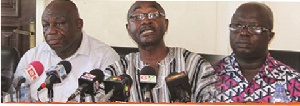The Electricity Company of Ghana (ECG) will embark on a major disconnection exercise of Government Ministries, Departments and Agencies effective 20th June this year due to the latter’s indebtedness to the company to the tune of several millions of Ghana Cedis.
According to the ECG, 40 % of its monthly billing have not been paid by Government outfits, leading to the financial bankruptcy of the company.
It has warned that any attempt to frustrate or hinder the debt reclamation exercise will be deemed illegal and tantamount to an obstruction of the constitutionally mandated duty of the company adding that any such move will be fiercely resisted.
Brother K. Bondzi Quaye, General Secretary of the Public Utility Worker’s Union (PUWU), made these remarks at a well attended press conference in the Hall of Trade Unions, where the Divisional Executive Committee of ECG senior and junior staff union members of PUWU also raised red flags over Government’s decision to hand over the Electricity Company of Ghana to a private investor on a concession for 25 years.
According to the workers of the ECG, the handover of the company to foreign private interest amounts to a betrayal and a sabotage of the many years of hard work of Ghanaian workers whose toils and labours were exploited towards the establishment and the survival of the company.
To buttress their opposition to the privatization of the ECG, Bondzie Quaye said, “ It is pertinent for Ghanaians to note that the World Bank, which over the years have been the “champion” of privatization, in its 2013 Report on the Energy Sector, do not support this move towards privatization of ECG via concession, which is being driven by the Millenium Challenge Corporation (MCC) of the United States of America.”
According to the aggrieved workers, rural electrification as a social intervention will suffer following the takeover bid of the company, adding that the grant money from the United States of America to enable the privatisation of the company is only targeted to improve ECG networks in Accra, Tema and Kasoa.
Again, they explained that creating a virtual private monopoly in the energy distribution sector has the potential of imposing hardship and chaos in the country and on the citizenry since the regulatory institutions are incapacitated to properly regulate the foreign companies.
A case in point is Uganda, where a foreign company has taken over a small distribution network but is fraught with shoddy performance leading to the invitation to other private companies to take over in an ever worsening electricity distribution by the companies.
The Public Utility Workers Union of the ECG stressed that it was not calling for an abrogation of the MCC Compact but rather, it urged the “Government of Ghana and the MCC to review the Private Sector Participation Project under the ECG Financial and Operational Turnaround Project in the compact and modify it to include pragmatic steps or measures that can bring efficiency and profitability to ECG so as to pay producers of power and to ensure smooth running of the sector primarily to the benefit of Ghana and Ghanaians.”
Concerns About the Computerised Billing System:
The Electricity Company of Ghana says the outrageous increases in utility tariffs must not be blamed on the new Computerised Billing software, but rather on some decisions of the Public Utility Regulatory Commission (PURC).
The workers revealed that the bills of consumers spiked to abnormal levels following a tariff increment in October 2013. That increment incurred the wrath of the public leading to a rebate of 25% in 2014.
Nonetheless, at the time of implementing a new tariff of 59.2 % in that year, the rebate of 25% had been taken off leading to an automatic increase in electricity bills. Worse of all, an energy sector levy of 5% of energy charge was also subsequently introduced in addition to a 5% levy for rural electrification.
According to the workers of the ECG by the new software billing system, the revenue mobilisation effort of the company has been decentralised to offer comfort to consumers across the country irrespective of where one might be.
The new system the workers said, makes it possible for one to apply for a meter for use in the Volta Region from Accra or the Western Region and brings much comfort and several advantages to the consumer.
General News of Friday, 10 June 2016
Source: Duke Tagoe

















